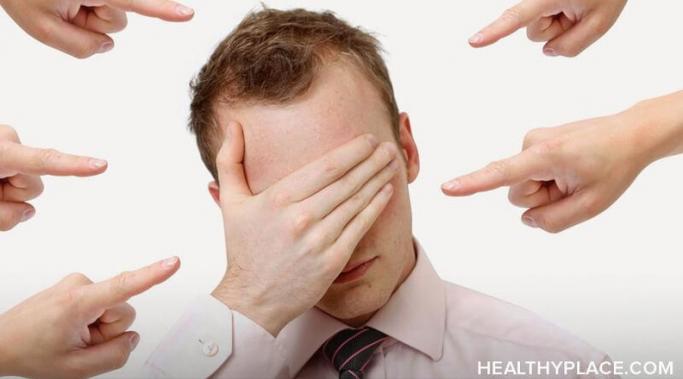Blogs
Being oversensitive to criticism is painful, and it often happens when you have low self-esteem. Whether the criticism is justified or not, your negative view of yourself distorts the criticism in a way that either maintains the low self-esteem or exacerbates it. You may not be able to avoid other people’s criticisms of you, but you can choose how you respond to those criticisms. Indeed, it is imperative to desensitize yourself so that you can separate reality from fiction and can feel confident about your self-worth, regardless of what anyone has to say.
For those of us living with posttraumatic stress disorder (PTSD), setting boundaries is crucial. Crucial, but also difficult. Trauma survivors with PTSD are commonly plagued by feelings of guilt, shame, or worthlessness, which can make the idea of standing up and setting boundaries feel futile or terrifying. It gets especially difficult when people don't respect those PTSD-related boundaries, which is a pretty common experience. Boundaries are broken, forgotten, or ignored all the time. Having to set--and then later repeat--your personal boundaries is exhausting. Living with PTSD makes setting boundaries imperative.
Spreading self-harm awareness is difficult because of self-harm stigma. Self-harm is often either cloaked in taboo or ridiculed as a kind of punchline. If you or someone you know struggles with self-harm or has struggled with self-harm in the past, you may find yourself frustrated by our culture’s general lack of empathy, understanding, and nuance in its approach to self-harm. But there is no need to feel helpless in the face of this frustration. Instead, think of it as an opportunity: an opportunity for you to speak your truth, so that others may hear it and finally know. You can spread self-harm awareness.
Attention-deficit/hyperactivity disorder (ADHD) myths and misconceptions are impacted by our culture. Culture does not create ADHD, but it does affect its definition, treatment, and perception. Studies show that ADHD is a fairly universal phenomenon, but varying cultural practices mean ADHD is more visible in some countries than in others. Diagnosis and treatment of ADHD also differ within each country due to medical access, cultural beliefs, and biases. As someone raised (mostly) in the United States by American parents, I would like to describe some of the ways in which American ideals can shape views, myths, and misconceptions about ADHD.
Obsessive thoughts are a kind of anxiety. Anxiety about a situation can set off obsessive thoughts, causing you to assume the worst outcome. It can make you feel like you've made the most horrible mistake in the world, even if it was something minor. There have been many times that my anxiety about something has grown into an obsession. Obsessive thoughts from anxiety cause many problems for me.
Applying the five stages of grief to the loss of a relationship, yes, even an abusive relationship, can help you to understand what you're going through and to guide you through the process. Grieving the loss of a relationship is a complex, messy process, and grieving the loss of an abusive relationship may be especially confusing. When thinking about an abusive relationship ending, people may think, "Good riddance;" and while a good riddance may very well be in order, it is not that simple a summation (Three Things We Need to Understand About Grief). If you're grieving the loss of a relationship, here's how and why the stages of grief can help you through the process.
Being in love with your abuser is painful and confusing. On the one hand, you may fear for your sanity, your sense of identity, and possibly even your life. On the other, you cling to the times your partner is loving and thoughtful, and feel that you're too in love to ever leave. You know he sometimes makes you miserable, but what about the times he makes you happy? Being in love with your abuser you is not unusual, and there are, in fact, logical explanations for your feelings.
When I was diagnosed with bipolar II disorder, I had no idea what to do next or how to cope with it. No pamphlet or online program guided me through the process of dealing with a new diagnosis of bipolar disorder. The worst part was, even though I had finally received a diagnosis and started the process of treatment, I still felt alone.
Parents need to keep medication records of prescriptions given to their mentally ill children. Recording the medications children with mental illness take will allow parents to track the benefits and side-effects of medication for their children and will allow for a continuity of coverage should you change doctors or insurance. Trust someone who made the mistake of not keeping medication records herself: Learn why you must keep and how to record your child's medication records.










I believe she will only be able to rid herself of her demons, and hopefully her BPD as well, when she's ready to confront the abuse of her father. If she can put the blame where it belongs, she may stop projecting that victim/perpetrator cycle on the present men in her life. These demons are a metaphor for the purgatory she has created for herself. That reality has consequences in the real world, but it need not be real in the tangible sense. Exorcising her demons will require the expenditure of real physical energy and probably the destruction of aspects of her personality. If this ever happens, and it's possible but not probable, then these demons will evaporate. They are only as real as one's personality is real. In short, reality is not the question, it's what you make of the things you feel to be real.